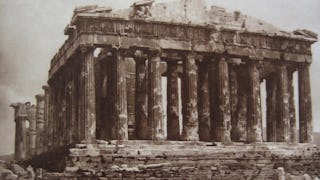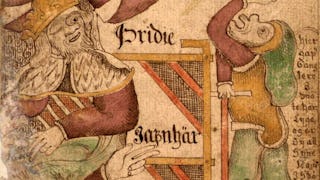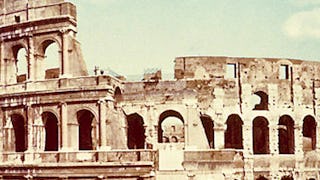Les mythes sont des histoires traditionnelles qui perdurent depuis longtemps. Certains d'entre eux sont liés à des événements de grande importance, comme la fondation d'une nation. D'autres racontent l'histoire de grands héros et héroïnes, leurs exploits et leur courage face à l'adversité. D'autres encore sont de simples récits sur des personnes tout à fait banales qui se mettent dans le pétrin ou accomplissent une action d'éclat. Que faut-il penser de tous ces récits et pourquoi les gens semblent-ils aimer les entendre ? Ce cours se concentrera sur les mythes de la Grèce et de la Rome antiques, afin d'explorer la nature du mythe et la fonction qu'il joue pour les individus, les sociétés et les nations. Nous accorderons également une certaine attention à la manière dont les Grecs et les Romains eux-mêmes comprenaient leurs propres mythes. Les mythes sont-ils des codes subtils qui contiennent une vérité universelle ? Sont-ils une fenêtre sur les profondeurs d'une culture particulière ? Sont-ils un ensemble d'œillères que nous portons tous, sans nous en rendre compte ? Ou s'agit-il simplement d'histoires divertissantes que les gens aiment raconter encore et encore ? Ce cours examinera ces questions à travers une variété de sujets, y compris la création de l'univers, la relation entre les dieux et les mortels, la nature humaine, la religion, la famille, le sexe, l'amour, la folie et la mort. *********************************************************************************************************** PROGRAMME DU COURS - Semaine 1 : Introduction Bienvenue dans la mythologie grecque et romaine ! Cette première semaine, nous présenterons le cours, en prêtant attention au fonctionnement du cours lui-même. Nous commencerons également à réfléchir au sujet qui nous occupe : le mythe ! Comment pouvons-nous commencer à définir le terme "mythe" ? Comment fonctionne le mythe ? Qu'est-ce que les théoriciens, philosophes et autres penseurs anciens et modernes ont à dire sur le mythe ? Cette semaine, nous commencerons également notre incursion dans l'univers d'Homère, afin de déterminer la meilleure façon d'aborder la poésie épique. Lectures : Pas de textes cette semaine, mais il serait bon de commencer la lecture de la semaine prochaine pour prendre de l'avance.



(2,481 avis)
Détails à connaître

Ajouter à votre profil LinkedIn
10 devoirs
Découvrez comment les employés des entreprises prestigieuses maîtrisent des compétences recherchées


Obtenez un certificat professionnel
Ajoutez cette qualification à votre profil LinkedIn ou à votre CV
Partagez-le sur les réseaux sociaux et dans votre évaluation de performance

Il y a 10 modules dans ce cours
Bienvenue dans le cours de mythologie grecque et romaine ! Cette première semaine, nous présenterons le cours, en prêtant attention à son fonctionnement. Nous commencerons également à réfléchir au sujet qui nous occupe : le mythe ! Comment pouvons-nous commencer à définir le terme "mythe" ? Comment fonctionne le mythe ? Qu'est-ce que les théoriciens, philosophes et autres penseurs anciens et modernes ont à dire sur le mythe ? Cette semaine, nous commencerons également notre incursion dans le monde d'Homère, afin de déterminer la meilleure façon d'aborder la poésie épique. Lectures : Pas de textes cette semaine, mais il serait bon de commencer la lecture de la semaine prochaine pour prendre de l'avance. Conférences vidéo : 1.1-1.7 Quiz : Complétez le quiz avant la fin de la semaine.
Inclus
8 vidéos1 lecture1 devoir1 sujet de discussion
Au cours de la deuxième semaine, nous entamons notre étude intensive des mythes à travers le poème épique d'Homère, l'Odyssée. Ce texte central nous offre non seulement une histoire passionnante à apprécier pour elle-même, mais aussi une sorte de laboratoire où nous pouvons étudier le mythe à l'aide de différentes approches théoriques. Cette semaine, nous nous concentrons sur le périple du jeune Télémaque, qui commence à atteindre l'âge adulte ; nous accompagnons également son père, Ulysse, dans son voyage de retour après la guerre de Troie. En chemin, nous examinerons les questions de l'héroïsme, des relations entre les dieux et les mortels, de la dynamique familiale et des valeurs homériques de l'hospitalité et de la débrouillardise. Lectures : Homère, Odyssée, livres 1-8. Conférences vidéo : 2.1-2.10. Quiz : Complétez le quiz avant la fin de la semaine.
Inclus
10 vidéos1 lecture1 devoir1 sujet de discussion
Cette semaine, nous suivrons les pérégrinations passionnantes d'Ulysse, "l'homme des tours et des détours", sur mer et sur terre. Les voyages du héros à l'étranger et son retour dans sa patrie sont semés d'embûches. Cette partie de l'Odyssée met en scène des monstres inoubliables et des sorcières exotiques ; nous suivons également Ulysse dans le monde souterrain, où il rencontre des ombres de camarades et de parents. C'est ici que nous découvrons quelques-unes des histoires les plus connues de tous les mythes anciens. Lectures : Homère, Odyssée, livres 9-16. Conférences vidéo : 3.1-3.10. Quiz : Complétez le quiz avant la fin de la semaine.
Inclus
10 vidéos1 lecture1 devoir1 sujet de discussion
Alors qu'il se rapproche de plus en plus de sa place à Ithaque et de sa famille, un Ulysse déguisé doit utiliser toutes ses ressources pour regagner son royaume. Nous verrons de nombreux exemples de retrouvailles alors qu'Ulysse commence prudemment à révéler son identité aux différents membres de sa famille - ses serviteurs, son chien, son fils et, enfin, sa femme Pénélope - tout en complotant contre ceux qui ont usurpé sa place. Lectures : Homère, Odyssée, livres 17-24. Conférences vidéo : 4.1-4.8. Questionnaire : Complétez le quiz avant la fin de la semaine.
Inclus
8 vidéos1 lecture1 devoir1 sujet de discussion
Nous allons examiner de près le récit de l'origine du cosmos qui fait le plus autorité dans l'antiquité grecque : la Théogonie d'Hésiode. Hésiode était généralement considéré comme le seul poète capable de rivaliser avec Homère. La Théogonie, ou "naissance des dieux", raconte l'existence d'un ordre de dieux plus anciens, antérieurs à Zeus, animés de passions puissantes - et d'appétits étranges ! Ce poème présente le début du monde comme une période de lutte acharnée et de violence, alors que l'univers commence à prendre forme et à s'ordonner à partir du chaos. Lectures : Hésiode, Théogonie *(les Travaux et les Jours ne sont pas requis pour le cours)*. Conférences vidéo : 5.1-5.9. Questionnaire : Complétez le quiz avant la fin de la semaine.
Inclus
9 vidéos2 lectures1 devoir1 sujet de discussion
Les lectures de cette semaine nous donnent l'occasion d'examiner de près la religion grecque sous ses différentes formes. Le mythe, bien sûr, constitue un aspect important de la religion, mais le rituel l'est tout autant. L'interaction entre les mythes et les rituels anciens nous apprend beaucoup sur ces deux formes culturelles puissantes. Nous lirons deux des plus grands hymnes aux divinités de l'Olympe, qui racontent des histoires personnelles et proches des dieux tout en fournissant des descriptions complexes des rituels qu'ils aiment que nous accomplissions en tant qu'humains. Lectures : Hymne homérique à Apollon ; Hymne homérique à Déméter (il y a deux hymnes pour chacun d'entre eux qui ont survécu, seul le plus long hymne à Apollon et le plus long hymne à Déméter sont requis pour le cours). Conférences vidéo : 6.1-6.7. Questionnaire : Complétez le quiz avant la fin de la semaine.
Inclus
7 vidéos1 lecture1 devoir1 sujet de discussion
Qu'est-ce qui constitue une action juste et qu'est-ce qui constitue une action injuste ? Qui doit en décider ? Ces questions sont plus délicates que certains voudraient nous le faire croire. Cette unité se penche sur l'un des problèmes de justice les plus épineux de l'Antiquité. Dans l'Orestie d'Eschyle - le seul exemple de tragédie qui nous soit parvenu sous la forme d'une trilogie -, nous entendons l'histoire du retour d'Agamemnon chez lui après la guerre de Troie. Contrairement aux retrouvailles joyeuses d'Ulysse avec sa femme et ses enfants, ce héros est trahi par ceux qu'il considérait comme ses plus proches. Le cycle de vengeance de cette famille, dont cette histoire n'est qu'un épisode, soulève des questions de justice et de loyautés concurrentes bien au-delà de la famille immédiate d'Agamemnon, pour finir sur l'Acropole d'Athènes elle-même. Lectures : Eschyle, Agamemnon ; Eschyle, Euménides. Conférences vidéo : 7.1-7.10. Quiz : Complétez le quiz avant la fin de la semaine.
Inclus
10 vidéos1 lecture1 devoir1 sujet de discussion
Cette semaine, nous découvrons deux tragédies célèbres, toutes deux situées à Thèbes et centrées sur des questions de culpabilité et d'identité : Œdipe roi de Sophocle et les Bacchantes d'Eurpide. Œdipe est persuadé qu'il peut échapper à l'impensable destin prédit par l'oracle de Delphes ; nous le voyons finalement réaliser l'horreur de ce qu'il a fait. Avec Ulysse, nous avons vu comment un grand héros peut reconstruire son identité après des luttes, tandis qu'Œdipe nous montre comment nos identités peuvent se dissoudre sous nos yeux. Le mythe d'Œdipe est celui de la transgression - intentionnelle ou non - et des limites de la connaissance humaine. Dans les Bacchantes d'Euripide, l'identité des dieux et des mortels est passée au crible. Dionysos, le dieu du vin et de la tragédie, mais aussi de la folie, apparaît ici comme un personnage sur scène. À travers la dissolution de Penthée, nous voyons les terribles conséquences qui peuvent survenir lorsque la divinité d'un dieu n'est pas reconnue à sa juste valeur. Lectures : Sophocle, Œdipe roi ; Euripide, Les Bacchantes. Conférences vidéo : 8.1-8.9. Quiz : Complétez le quiz avant la fin de la semaine.
Inclus
9 vidéos1 lecture1 devoir1 sujet de discussion
En avançant de plusieurs siècles, nous nous rendons dans une autre partie de la Méditerranée pour laisser les Romains nous donner leur vision du mythe. Bien que de nombreux poètes aient tenté de réécrire Homère pour leur propre époque, personne n'y est parvenu comme Vergile. Son poème épique, l'Énéide, est la chronique d'une puissante reconstruction d'une culture qui s'identifie et se définit à la fois par rapport à des mythes déjà connus. Contrairement à la rareté des informations sur Homère, nous en savons beaucoup sur la vie et le contexte historique de Vergile, ce qui nous permet d'avoir un aperçu de la création de mythes en action. Lectures : Vergile, L'Enéide, livres 1-5. Conférences vidéo : 9.1-9.10. Quiz : Complétez le quiz avant la fin de la semaine.
Inclus
10 vidéos2 lectures1 devoir1 sujet de discussion
Notre examen du récit de Vergile se termine avec son voyage aux enfers dans le livre 6. Nous nous tournerons ensuite vers un poète romain plus enjoué, Ovide, dont le génie se manifeste dans presque tous les registres. Profond, spirituel et satirique à la fois, les puissants récits d'Ovide sur de nombreux mythes antiques sont devenus les versions qui nous sont les plus familières aujourd'hui. Enfin, à travers le prisme des Romains et d'autres qui "remythologisent", nous conclurons le cours par un regard rétrospectif sur les mythes. Lectures : Vergile, Enéide, livre 6 ; Ovide, Métamorphoses, livres 3, 12 et 13. Conférences vidéo : 10.1-10.9. Questionnaire : Complétez le quiz avant la fin de la semaine.
Inclus
9 vidéos1 lecture1 devoir1 sujet de discussion
Instructeur

Offert par
En savoir plus sur Philosophie


Wesleyan University


Wesleyan University


University of Colorado Boulder


University of Arizona
Pour quelles raisons les étudiants sur Coursera nous choisissent-ils pour leur carrière ?




Avis des étudiants
2 481 avis
- 5 stars
82,60 %
- 4 stars
14,25 %
- 3 stars
2,17 %
- 2 stars
0,52 %
- 1 star
0,44 %
Affichage de 3 sur 2481
Révisé le 1 juil. 2017
Thoroughly enjoyable and instructive introduction to a different world and our historical and present interpretation of its meanings and mysteries. Would recommend to a friend or family member.
Révisé le 30 avr. 2020
I really enjoyed this course, it helped me put together the snippets of my previous knowledge and gives more structure and context. The lecturer is very likeable and engaging.
Révisé le 6 nov. 2021
A great course! Professor Struck gave in depth lectures while still managing to cover a wide range of texts in an engaging manner. I thoroughly enjoyed the experience, and learned a lot.

Ouvrez de nouvelles portes avec Coursera Plus
Accès illimité à 10,000+ cours de niveau international, projets pratiques et programmes de certification prêts à l'emploi - tous inclus dans votre abonnement.
Faites progresser votre carrière avec un diplôme en ligne
Obtenez un diplôme auprès d’universités de renommée mondiale - 100 % en ligne
Rejoignez plus de 3 400 entreprises mondiales qui ont choisi Coursera pour les affaires
Améliorez les compétences de vos employés pour exceller dans l’économie numérique
Foire Aux Questions
Il n'y a pas de textes obligatoires pour ce cours, mais le professeur Struck fera référence aux textes suivants dans son cours :
- Tragédies grecques, Volume 1, David Grene et Richmond Lattimore, trans. (Chicago)
- Tragédies grecques, Volume 3, David Grene et Richmond Lattimore , trans. (Chicago)
- Hésiode, Théogonie et Travaux et Jours, M. L. West, trans. (Oxford)
- Hymnes homériques, Sarah Ruden, trans. (Hackett)
- Homère, L'Odyssée, Robert Fagles, trans. (Penguin)
- Virgile, L'Enéide, Robert Fitzgerald, trans. (Vintage)
- Ovide, Les Métamorphoses, David Raeburn, trans. (Penguin)
- Semaine 1 : Introduction
Bienvenue dans le cours de mythologie grecque et romaine ! Cette première semaine, nous présenterons le cours, en prêtant attention à son fonctionnement. Nous commencerons également à réfléchir au sujet qui nous occupe : le mythe ! Comment pouvons-nous commencer à définir le terme "mythe" ? Comment fonctionne le mythe ? Qu'est-ce que les théoriciens, philosophes et autres penseurs anciens et modernes ont à dire sur le mythe ? Cette semaine, nous commencerons également notre incursion dans le monde d'Homère, afin de déterminer la meilleure façon d'aborder la poésie épique.
Lectures : Pas de textes cette semaine, mais il serait bon de commencer la lecture de la semaine prochaine pour prendre de l'avance.
Conférences vidéo : 1.1-1.7
Quiz : Complétez le quiz avant la fin de la semaine.
- Semaine 2 : Devenir un héros
Au cours de la deuxième semaine, nous commençons notre étude intensive des mythes par le biais du poème épique d'Homère, l'Odyssée. Ce texte central nous offre non seulement une histoire passionnante à apprécier en tant que telle, mais aussi une sorte de laboratoire où nous pouvons étudier le mythe à l'aide de différentes approches théoriques. Cette semaine, nous nous concentrons sur le périple du jeune Télémaque, qui commence à atteindre l'âge adulte ; nous accompagnons également son père, Ulysse, dans son voyage de retour après la guerre de Troie. En chemin, nous examinerons les questions de l'héroïsme, des relations entre les dieux et les mortels, de la dynamique familiale et des valeurs homériques de l'hospitalité et de la débrouillardise.
Lectures : Homère, Odyssée, livres 1-8
Conférences vidéo : 2.1-2.10
Questionnaire : Complétez le quiz avant la fin de la semaine.
- Semaine 3 : Aventures à l'aller et au retour
Cette semaine, nous suivrons les pérégrinations passionnantes d'Ulysse, "l'homme des tours et des détours", sur mer et sur terre. Les voyages du héros à l'étranger et son retour dans sa patrie sont semés d'embûches. Cette partie de l'Odyssée met en scène des monstres inoubliables et des sorcières exotiques ; nous suivons également Ulysse dans le monde souterrain, où il rencontre des ombres de camarades et de parents. Nous découvrons ici quelques-unes des histoires les plus connues de tous les mythes antiques.
Lectures : Homère, Odyssée, livres 9-16
Conférences vidéo : 3.1-3.10
Quiz : Complétez le quiz avant la fin de la semaine.
- Semaine 4 : Identité et signes
Alors qu'il se rapproche de plus en plus de sa place à Ithaque et de sa famille, un Ulysse déguisé doit utiliser toutes ses ressources pour regagner son royaume. Nous verrons de nombreux exemples de retrouvailles alors qu'Ulysse commence prudemment à révéler son identité aux différents membres de sa famille - ses serviteurs, son chien, son fils et, enfin, sa femme Pénélope - tout en complotant contre ceux qui ont usurpé sa place.
Lectures : Homère, Odyssée, livres 17-24
Conférences vidéo : 4.1-4.8
Questionnaire : Complétez le quiz avant la fin de la semaine.
- Semaine 5 : Dieux et humains
Nous examinerons de près le récit de l'origine du cosmos qui fait le plus autorité dans l'antiquité grecque : la Théogonie d'Hésiode. Hésiode était généralement considéré comme le seul poète capable de rivaliser avec Homère. La Théogonie, ou "naissance des dieux", raconte l'existence d'un ordre de dieux plus anciens, antérieurs à Zeus, animés de passions puissantes - et d'appétits étranges ! Ce poème présente le début du monde comme une période de lutte acharnée et de violence, alors que l'univers commence à prendre forme et à s'ordonner à partir du chaos.
Lectures : Hésiode, Théogonie *(les Travaux et les Jours ne sont pas requis pour le cours)*
Conférences vidéo : 5.1-5.9
Questionnaire : Complétez le quiz avant la fin de la semaine.
- Semaine 6 : Rituel et religion
Les lectures de cette semaine nous donnent l'occasion d'examiner de près la religion grecque sous ses différentes formes. Les mythes, bien sûr, constituent un aspect important de la religion, mais il en va de même pour les rituels. L'interaction entre les mythes et les rituels anciens nous apprend beaucoup sur ces deux formes culturelles puissantes. Nous lirons deux des plus grands hymnes aux divinités de l'Olympe, qui racontent des histoires personnelles et proches des dieux tout en fournissant des descriptions complexes des rituels qu'ils aiment que nous accomplissions en tant qu'humains.
Lectures : Hymne homérique à Apollon ; Hymne homérique à Déméter (il y a deux hymnes pour chacun d'entre eux qui ont survécu, seul le plus long hymne à Apollon et le plus long hymne à Déméter sont requis pour le cours)
Conférences vidéo : 6.1-6.7
Questionnaire : Complétez le quiz avant la fin de la semaine.
- Semaine 7 : La justice
Qu'est-ce qui compte pour une action juste et qu'est-ce qui compte pour une action injuste ? Qui doit en décider ? Ces questions sont plus délicates que certains voudraient nous le faire croire. Cette unité se penche sur l'un des problèmes de justice les plus épineux de l'Antiquité. Dans l'Orestie d'Eschyle - le seul exemple de tragédie qui nous soit parvenu sous la forme d'une trilogie -, nous entendons l'histoire du retour d'Agamemnon chez lui après la guerre de Troie. Contrairement aux retrouvailles joyeuses d'Ulysse avec sa femme et ses enfants, ce héros est trahi par ceux qu'il considérait comme ses plus proches. Le cycle de vengeance de cette famille, dont cette histoire n'est qu'un épisode, soulève des questions de justice et de loyautés concurrentes bien au-delà de la famille immédiate d'Agamemnon, pour finir sur l'Acropole d'Athènes elle-même.
Lectures : Eschyle, Agamemnon ; Eschyle, Euménides
Conférences vidéo : 7.1-7.10
Quiz : Complétez le quiz avant la fin de la semaine.
- Semaine 8 : L'instabilité du moi
Cette semaine, nous abordons deux tragédies célèbres, toutes deux situées à Thèbes et centrées sur des questions de culpabilité et d'identité : Œdipe roi de Sophocle et Les Bacchantes d'Eurpide. Œdipe est persuadé qu'il peut échapper à l'impensable destin prédit par l'oracle de Delphes ; nous le voyons finalement réaliser l'horreur de ce qu'il a fait. Avec Ulysse, nous avons vu comment un grand héros peut reconstruire son identité après des luttes, tandis qu'Œdipe nous montre comment nos identités peuvent se dissoudre sous nos yeux. Le mythe d'Œdipe est celui de la transgression - intentionnelle ou non - et des limites de la connaissance humaine. Dans les Bacchantes d'Euripide, l'identité des dieux et des mortels est passée au crible. Dionysos, le dieu du vin et de la tragédie, mais aussi de la folie, apparaît ici comme un personnage sur scène. À travers la dissolution de Penthée, nous voyons les terribles conséquences qui peuvent survenir lorsque la divinité d'un dieu n'est pas reconnue à sa juste valeur.
Lectures : Sophocle, Œdipe roi ; Euripide, Les Bacchantes
Conférences vidéo : 8.1-8.9
Quiz : Complétez le quiz avant la fin de la semaine.
- Semaine 9 : Le héros romain, refait à neuf
En avançant de plusieurs siècles, nous sautons dans une autre partie de la Méditerranée pour laisser les Romains nous donner leur vision du mythe. Bien que de nombreux poètes aient tenté de réécrire Homère pour leur propre époque, personne n'y est parvenu comme Vergile. Son poème épique, l'Énéide, est la chronique d'une puissante reconstruction d'une culture qui s'identifie et se définit à la fois par rapport à des mythes déjà connus. Contrairement à la rareté des informations sur Homère, nous en savons beaucoup sur la vie et le contexte historique de Vergile, ce qui nous permet d'avoir un aperçu de la création de mythes en action.
Lectures : Vergile, L'Enéide, livres 1-5
Conférences vidéo : 9.1-9.10
Quiz : Complétez le quiz avant la fin de la semaine.
- Semaine 10 : Le mythe romain et les métamorphoses d'Ovide
Notre examen du récit de Vergile se termine par son voyage aux enfers dans le livre 6. Nous nous tournerons ensuite vers un poète romain plus enjoué, Ovide, dont le génie se manifeste dans presque tous les registres. Profond, spirituel et satirique à la fois, les puissants récits d'Ovide sur de nombreux mythes antiques sont devenus les versions qui nous sont les plus familières aujourd'hui. Enfin, à travers le prisme des Romains et d'autres qui "remythologisent", nous conclurons le cours par un regard rétrospectif sur les mythes.
Lectures : Vergile, Enéide, livre 6 ; Ovide, Métamorphoses, livres 3, 12 et 13.
Conférences vidéo : 10.1-10.9.
Questionnaire : Complétez le quiz avant la fin de la semaine.
L'accès aux cours et aux devoirs dépend de votre type d'inscription. Si vous suivez un cours en mode audit, vous pourrez consulter gratuitement la plupart des supports de cours. Pour accéder aux devoirs notés et obtenir un certificat, vous devrez acheter l'expérience de certificat, pendant ou après votre audit. Si vous ne voyez pas l'option d'audit :
Il se peut que le cours ne propose pas d'option d'audit. Vous pouvez essayer un essai gratuit ou demander une aide financière.
Le cours peut proposer l'option "Cours complet, pas de certificat" à la place. Cette option vous permet de consulter tous les supports de cours, de soumettre les évaluations requises et d'obtenir une note finale. Cela signifie également que vous ne pourrez pas acheter un certificat d'expérience.
Plus de questions
Aide financière disponible,


